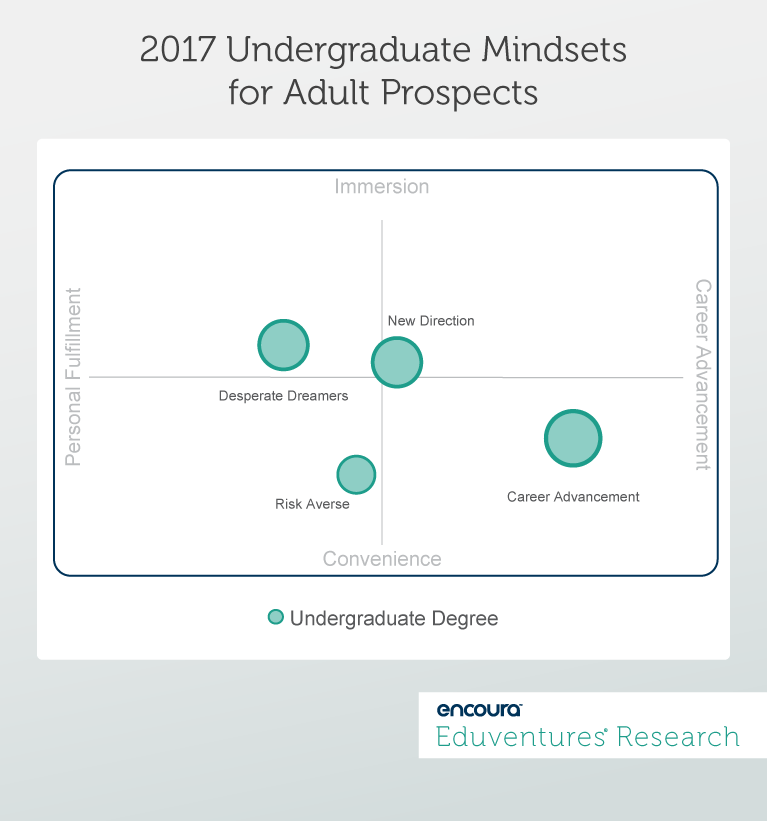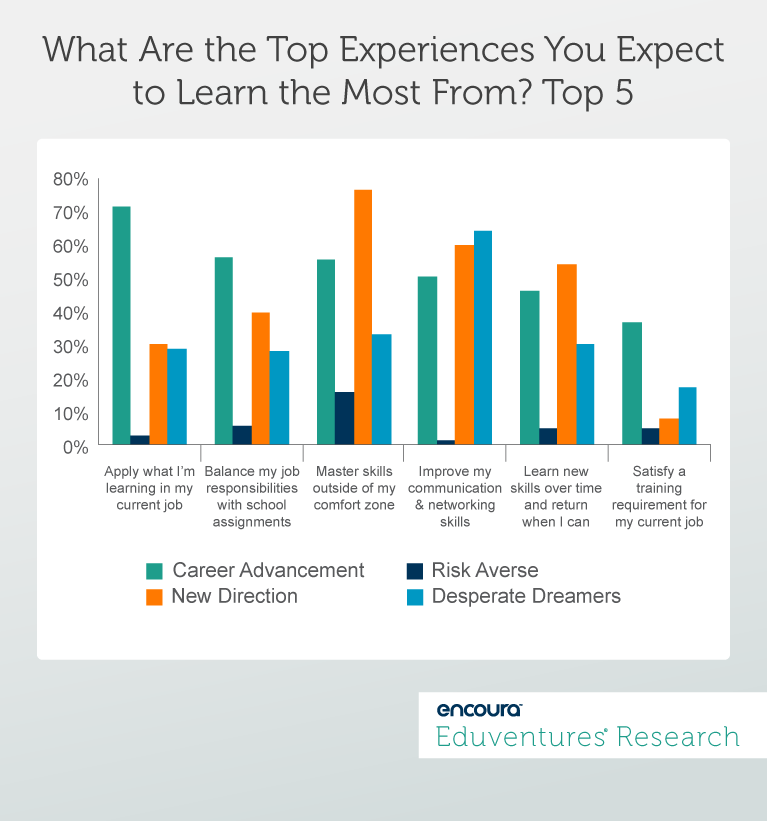We hear a lot these days about enrollment “fit” – the need for prospective students and schools to be closely aligned in order to ensure high retention and graduation rates. A laudable cause, no doubt, when it comes to the “traditional” student: those first-time, full time enrollees entering college right out of high school. Eduventures’ recent Prospective Student Mindsets provides invaluable insights into understanding these students.
But can “fit” be applied to the ubiquitous adult learner? While schools have learned much about the range and variety of traditional learners, the same cannot be said for older, working students, who are subject to a web of economic conditions, prior educational experiences, and the demands of work and family.
The scale of this problem can be overwhelming: the Lumina Foundation recently reported that 40% of U.S. residents aged 25-34 lack a degree or credential from a college or university, equaling roughly 36 million adults. Clearly, precise and actionable data about how these students learn is long overdue.
The National Center for Educational Statistics’ use of age 25 as demarcation between “traditional” and “non-traditional” students leaves huge diversity unexamined. What similarities actually exist between a 26-year-old prospective graduate student and a 45-year-old, unemployed worker with a high school diploma seeking an undergraduate certificate enter a new industry?
Adult learners are anything but monolithic. While many respond to affordable and flexible programs, their ability to persist and successfully complete a certificate or degree program reflects a far more complex set of perceptions, attitudes, and behaviors.


A New Lens for Adult Learner Behavior and Perceptions
Eduventures Research has long recognized this complexity. Our 2017 Adult Prospect Survey takes another important step forward in an effort to shed new light on adult learner behaviors and preferences. This forthcoming research features a set of behavioral and attitudinal segmentations derived from the responses of 3,000 nationally representative adults who have indicated that they plan to return to school to either complete a degree or some other credential. Based on their responses to questions about expected outcomes and desired program features, we have identified 10 distinct mindsets among adults seeking certificates or non-credit programming, undergraduate degrees, and graduate degrees. While it is commonly understood that adult prospects can be distributed along a continuum between career advancement and personal fulfillment, our research provides sharper analysis of a less-understood dimension: some learners opt for in-depth immersive learning experiences, putting their work and family life on hold, while others place a higher value on convenience. The combination of these factors provides greater clarity and new insight into prospects’ attitudes and behaviors regarding school. Figure 1 arrays the 2017 undergraduate mindsets for adult prospects along these dimensions.
Figure 1
For example, among students seeking undergraduate degrees, Figure 2 contrasts Career Advancement ladder-climbers with their peers who are trying to reboot their education, the New Direction learners (Figure 2). When asked to identify the ways in which they anticipate learning the most, some notable patterns emerge.
Figure 2
Career Advancement learners expect a degree program to apply directly to their existing jobs; they are confident in their current skillset, but need a degree to validate their expertise. In contrast, New Direction learners hope to master entirely new skills. The cautious and skeptical Risk Averse learners exhibit little understanding or inspiration about how school may help them. Desperate Dreamers tend to see higher education in more idealistic terms, showing less interest in a specific career path and more enthusiasm for building generic skills, opening horizons, and networking. This just scratches the surface of what a mindset approach can tell us. Mindsets serve as a window into the deep-seated concerns these learners have about the risks, both financial and personal, that they assume by returning to school. These kinds of insights can help institutions make more informed decisions about how to recruit, retain, and support these students.Converting Insights into Action
A mindset-driven approach to understanding the complexities of these prospects can dispel the fallacy of a monolithic adult learner. Instead, these adult mindsets can serve as descriptive guideposts to the range and variety of learner behaviors, preferences, and attitudes; they provide a differentiated understanding of how adult learners view the prospect of returning to school. This study also examines attitudes toward the comparative prestige of certificates versus degrees, perceptions of online and blended learning, and concerns over debt. Data regarding price sensitivity and value for certificate and degree programs can also be assessed through the lens of these mindsets. Eduventures will use these prospective learner mindsets to help institutions address a broad range of enrollment and retention questions. Among them:- How do the demands of balancing life, work and school impact the way adults think about learning, teaching, and the expectations of a certificate or degree program?
- How might prior experiences in school impact adults’ willingness to return to school and their ability to persist through difficult challenges?
- Are all adult learners motivated by the same economic forces, or are there subtle differences among them?

